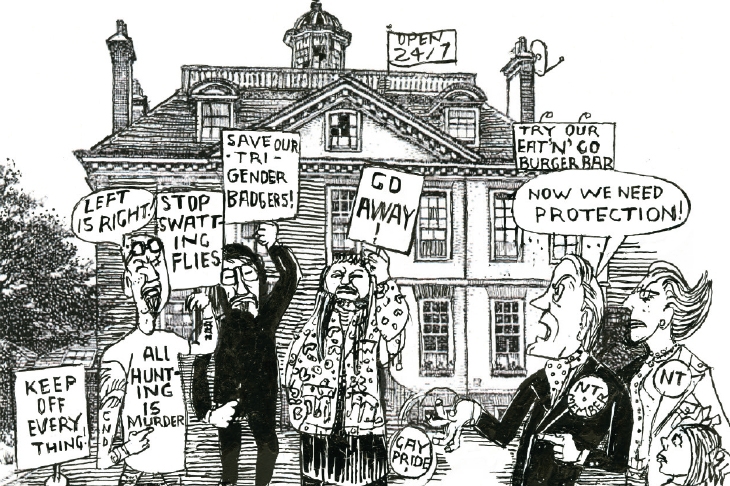For the sound of his horn brought me from my bed/ And the cry of his hounds which he oft times led/ Peel’s ‘View, Halloo!’ could awaken the dead/ Or the fox from his lair in the morning.
Back in the early 1800s, the legendary huntsman John Peel galloped all over the northern Lake District. His successors are the Blencathra Hunt, a ‘fell pack’ who hunt on foot, but the Blencathra may be the last to hunt on Peel territory. Much of the Lake District is owned by the National Trust, the UK’s largest private landowner, and at the next National Trust AGM, on 21 October, a motion is being put forward which proposes banning trail hunting on all the Trust’s land.
Members will receive their voting papers in the coming weeks — but even before the vote has taken place, the Trust has already changed its stance. Last week, it surreptitiously changed the rules for hunts operating on its land. Future ‘meets’ must advertise themselves on the Trust website, it said, and no ‘animal-based scents’ should be used.
These might seem like small changes, but as the National Trust well knows, they are not. They will make it incredibly difficult — if not impossible — for hunts to operate. Publishing information about meets in advance is a gift to hunt saboteurs. Forewarned, they can plan and gather en masse. This means more police will be needed to protect the hunt, which is an exasperating waste of police time, and more farmers are likely to think that letting the hunt gallop over their land just isn’t worth the hassle.
Because foxhounds are currently trained to follow an animal-based scent, introducing a new scent involves retraining. It might even mean that the 67 hunts affected by the ban have to breed new packs of hounds.
Dame Helen Ghosh, the current head of the Trust, has not had a quiet time of it during her tenure. She has been accused of ‘dumbing down’ Trust properties and politicising the charity. Under her leadership, a row erupted over the word ‘Easter’ being airbrushed from the Trust’s springtime egg hunts. Volunteers were very nearly forced to wear gay pride badges. Which way will the crucial hunt vote go? It’s instructive to look at what Ghosh has previously said about trail hunting on National Trust land.
Back in March she was quizzed about why they allow it to take place. She replied: ‘We have had a lot of correspondence, there has been a lot on social media.’
The trouble with paying too much attention to outrage expressed on social media is that it doesn’t bear much resemblance to the ‘real’ world. Activists are adept at using online petitions to give pet causes more heft. The League against Cruel Sports has, as it puts it, ‘supported’ the motion on the ban. But it’s not as if it represents the average National Trust-loving tourist.
There is an online petition running at the moment calling on the Trust to ‘revoke land use for “trail” hunts’. It has at the time of writing been signed 136,028 times, but according to the data provided by the petition’s website only 67,887 of those supporters are in the United Kingdom. So who are they all? Do they even exist? No one at the Trust checks to make sure the signatories are all actual people and not part of some co-ordinated campaign. If the signatories don’t even live in the UK, should anyone take their ‘vote’ seriously? In August, various animal rights groups organised a march through London which protested against a number of issues, including the badger cull, grouse shooting and fox hunting. Promoted by that prolific activist Chris Packham, it gained traction on social media and was billed as ‘Britain’s largest ever wildlife protection march’. In the event, only about 1,000 people actually turned up. That was not much reported. Clicks on social media do not mean feet on the ground.
When it comes to shooting, the National Trust takes a very different view. It states that: ‘We allow field sports to take place on our property where traditionally practised, provided they are within the law’. But hunting with hounds is legal. Why should the two be different?
Ghosh admits that a number of the Trust’s actions in recent years have alienated what she calls its ‘perhaps more traditional visitors’. Well exactly, Dame Helen. If you bend yourself too much towards your new ‘audience’, you’ll lose the support of your trusted and long-term supporters — not to mention your financial backers. There are rumours that some of the charity’s more serious benefactors will pull their funding if the ban goes ahead. This could be a change that the Trust lives to regret.
Camilla Swift and Jim Barrington discuss trail hunting on The Spectator Podcast.







Comments